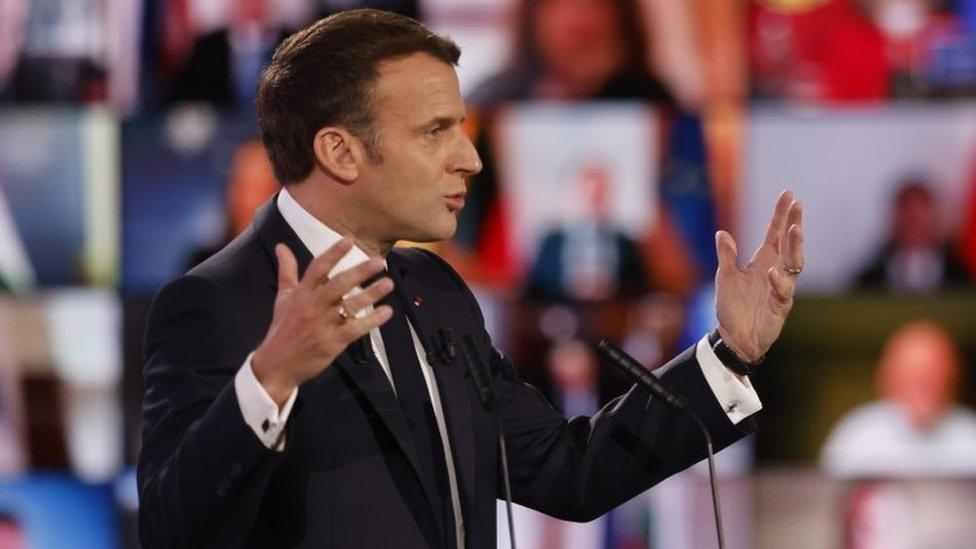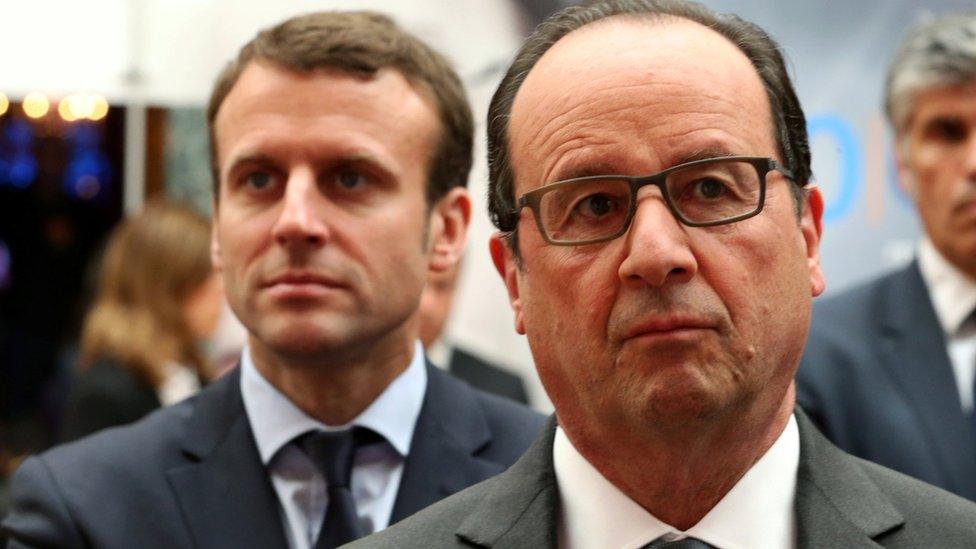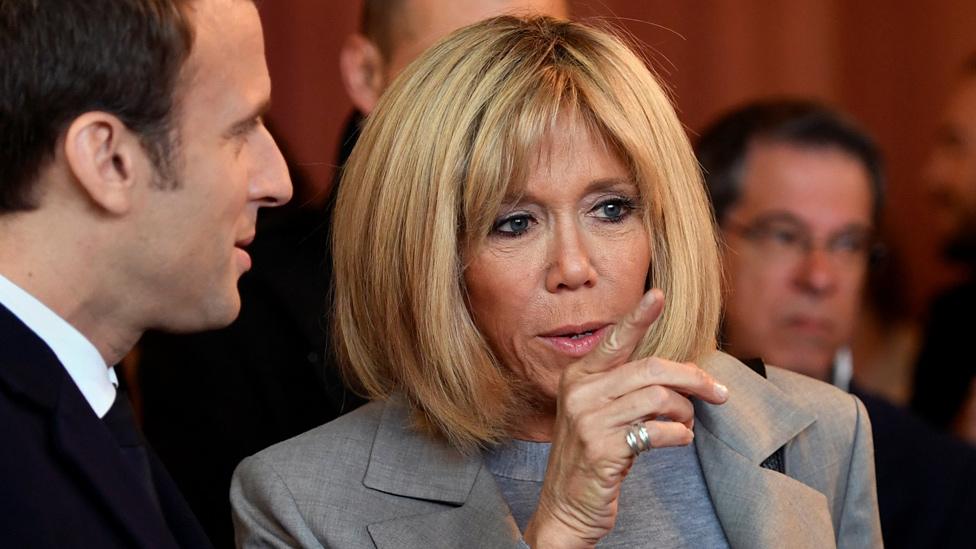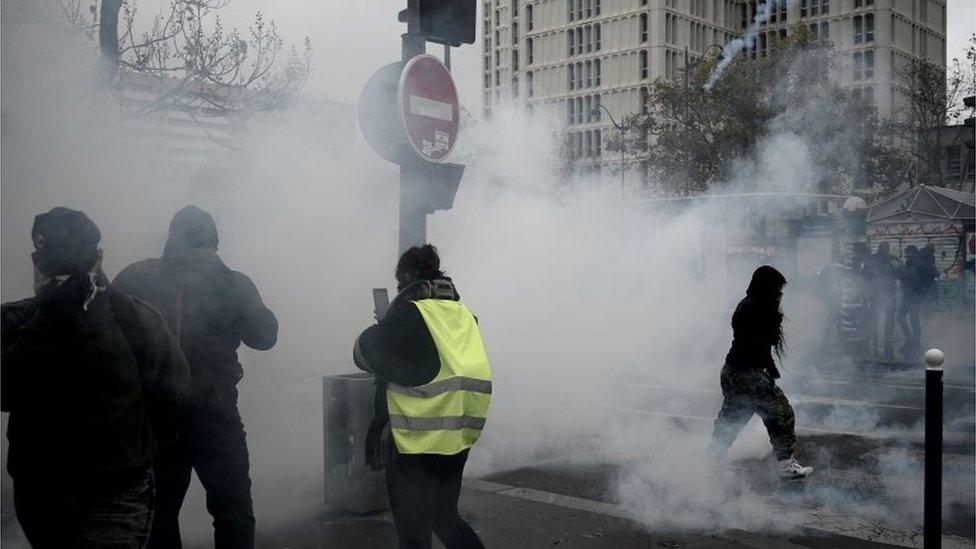Macron: French leader buffeted by protests and Covid
- Published

A controversial and contradictory figure who has proved a divisive leader
Emmanuel Macron was just 39 when he was voted in as France's youngest president, capping the meteoric rise of a man who had never been elected as an MP.
Within weeks the nebulous La République En Marche! movement that rose with him had swept to a parliamentary majority.
Described by others as a centrist or liberal, he himself prefers to talk of uniting the French people rather than bridging the left and right: this former investment banker who arrived at the frontline of French politics with Socialist President François Hollande as his mentor.
As president, Emmanuel Macron has been a controversial and contradictory figure, at times defiant, at times conciliatory, often divisive.
His first four years have thrown up a swathe of challenges - the "yellow vest" movement's opposition to many of his social reforms, continuing fear of Islamist extremism and, of course, the global coronavirus pandemic and its devastating effects on both the people and the economy.
As he prepares to fight for another five years at the Élysée Palace, what would Emmanuel Macron have to do to avoid becoming the third successive one-term president?

How Macron seized the centre of French politics
His rise was heralded by supporters as a soothing tonic to the election of populists such as Donald Trump and to the difficulties faced by the EU - an organisation he wholly supports - after the Brexit referendum.
And he had done it by sweeping away the traditional parties on the right and left. His first major role came as economy minister in Manuel Valls's Socialist government - in 2014. He was the business-friendly face and his "Macron law" was pushed through on that basis - including reforms to Sunday working and the deregulation of some sectors of industry.
But as his political ambitions increased, his position in government became awkward, particularly in April 2016 when he set up En Marche.

For years Mr Macron was President Hollande's protege
The friction with the Socialists was clear. He told one union member "the best way to afford a suit is to work" and was pelted with eggs. He resigned and went on to focus on his presidential bid.
On the campaign trail he showed himself to be a polished performer. Raising his arms to the heavens and crying "Vive la France!" at one rally was ridiculed by some, but it got his message across.
He had the occasional wobble. A claim that France's colonisation of Algeria had been a "crime against humanity" led to an outcry and a brief setback in the polls. But he was also deft - particularly when deflecting slurs about his private life.
Emmanuel Macron's unconventional route to political stardom in France
While he benefited from a sleaze scandal that hit the conservative Republicans candidate, François Fillon, his bold seizure of the centre ground left the Socialists and Les Republicains - the decades-old political elite - reeling.
He also showed he could take on far-right rival, Marine Le Pen, hurling insults just as forcefully as she did during one vitriolic TV debate. Mr Macron won the first presidential round and then saw off Ms Le Pen in the second round with 66% of the vote.

Emmanuel Macron - a biog in brief
Born in the northern city of Amiens to parents who were both doctors
Educated at the prestigious Henri-IV public secondary school in Paris
Attended the elite ENA college, traditionally the incubator for France's top civil servants
Married his former drama teacher, Brigitte Trogneux, 20 years his senior, in 2007. She was quoted by Paris Match magazine as saying: "At the age of 17, Emmanuel said to me, 'Whatever you do, I will marry you!'"
Joined Rothschild & Cie in 2008 as an investment banker
Took senior advisory role for President Hollande in 2012

Brigitte Trogneux - Mr Macron's ex-drama teacher and now wife - fascinates the media


First term beset by protest
Emmanuel Macron ran on a platform that mixed public sector investment with business friendly policies. And the sweeping parliamentary victory of En Marche! with its make-up of MPs from "civil society" and corralled from left and right, promised to be inclusive and to transcend the old political divisions.
Mr Macron wanted to end France's 35-hour week for younger workers. "When you're young, 35 hours isn't enough. You want to work more and learn your job," he told Le Nouvel Observateur, external.
But when the policies were formed and presented, many people, including those facing financial challenges, began to complain of economic injustice. The growth of the leaderless "yellow vest" protest movement - named after its high-visibility jackets at rallies - confronted President Macron's reformist goals.
In order to quell the growing anger, and widespread sympathy among French voters more generally, Mr Macron was forced to row back on the fuel tax rises that triggered the movement, and offer additional measures including a rise in the minimum wage and a cut to pension tax. For weeks in early 2019 he toured France, talking to local mayors and citizens as part of a grand débat - a big national debate.
He promised to scrap one of France's elite colleges, the Ecole Nationale d'Administration, that has acted as a training ground for successive presidents, Mr Macron include.
And yet some En Marche members who had embraced centrism were unhappy with what they saw as a lurch to the right and decided to leave.
In May 2020, Mr Macron's party lost its outright majority in parliament after a group of MPs broke away to form a new party. In July, PM Edouard Philippe quit and was replaced by centre-right mayor Jean Castex, with the president promising a "new path".
Some critics accused Mr Macron of trumpeting Islamophobic policies to win votes from the Le Pen camp.
The beheading of teacher Samuel Paty in October 2020 after he showed students cartoons of the Prophet Muhammad underlined that militant Islamism remained a threat in France and further enflamed divisions over France's secular identity.
Then in May 2021 an open letter appeared in a right-wing magazine from a group of retired generals and service personnel who warned of "civil war" over President Macron's "concessions" to Islamism.
But the biggest challenge of all - as it has been for most governments - has been Covid-19.
France has endured the same waves as most of Europe and has been through three lockdowns.
There have been more than 100,000 deaths and, by May 2020, France's 5.8 million infections was the fourth highest in the world.
Mr Macron, who tested positive for Covid-19 in December 2020 with typical symptoms, has never been a fan of lockdowns.
He batted away medical opinion by staving off the third in January 2021, only to introduce tougher measures by April following a surge in cases and the need for hospital beds. But he was back to easing restrictions by May.
Like many leaders, he has won support and criticism over Covid-19 policies. The main question remains - how will it effect the election next year?
Opinion polls suggest a repeat of the 2017 second-round run-off, with Mr Macron facing Marine Le Pen, as head of a revamped and rebranded National Rally party.
One year away, his approval ratings were around 35% - low but still better than Mr Hollande or Nicolas Sarkozy at the same point.
Mr Macron is projected to win the second round. However, he is not a conventional first-term president. There could be blips like the one that befell Mr Fillon, or a third challenger could make the same kind of gains that Mr Macron did in 2017.
Macron on the world stage
Advocated a Europe-first approach, including a European army, calling Nato "brain dead"
Also advocated French "ambition and audacity", sending troops to north and west Africa and Syria. "France must become a great power again," he said
Regularly butted heads with the UK, including border closures over Covid-19 and on fishing rights
Another key adversary was Turkish President Recep Tayyip Erdogan, who said Mr Macron needed "mental health checks"
Tried briefly to be best buddy with Donald Trump but the relations were always up and down - as a battle-of-the-top-dogs handshake at a G7 summit in 2018 revealed
Who left their mark on President Trump at the G7 summit?
- Published16 November 2019
